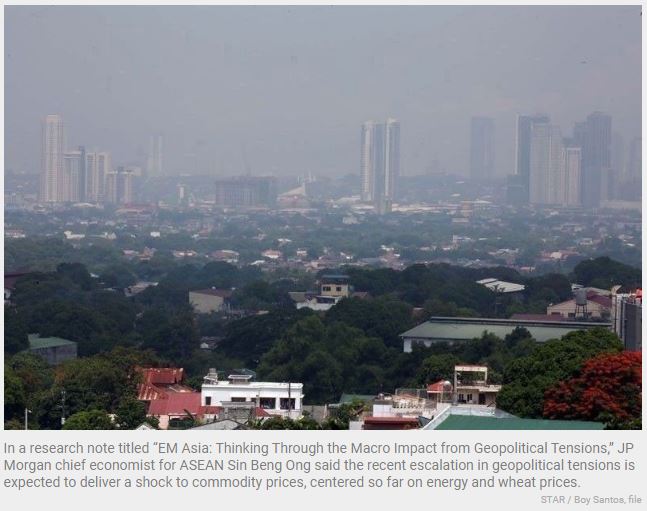Philippines seen to suffer biggest GDP cut in Asia
Amid surge in oil prices
MANILA, Philippines — The Philippines will incur the biggest reduction in gross domestic product (GDP) in Asia at 0.4 percentage point as global oil prices continue to soar following Russia’s invasion of Ukraine, JP Morgan Chase & Co. said.
In a research note titled “EM Asia: Thinking Through the Macro Impact from Geopolitical Tensions,” JP Morgan chief economist for ASEAN Sin Beng Ong said the recent escalation in geopolitical tensions is expected to deliver a shock to commodity prices, centered so far on energy and wheat prices.
In its baseline scenario, Ong said JP Morgan expects the global benchmark, Brent oil prices, to lift to an average of $110 per barrel in the second quarter from a prior estimate of around $90 per barrel.
Likewise, Ong warned that the surge in wheat prices would also be evident in food prices, even though in Emerging Asia the primary staple is rice, which has, thus far, been less affected.
As a result, Ong said JP Morgan sees higher global oil prices that have a weight of 6.9 percent in the consumer price index rising by 0.8 percentage point, ranking third in terms of impact after Thailand’s 1.4 percent, as well as Singapore’s and Korea’s 0.9 percentage point.
“In our view, there are two main channels through which an adverse energy price shock would impact the region: the first via a negative real income impact on growth, initially via private consumption, and second, with a lag, through trade, which then affects capital spending,” he said.
Ong said Philippine GDP growth would be reduced by 0.4 percentage point once global oil prices hit $110 per barrel. This is the biggest followed by South Korea with 0.3 percentage points and China, Hong Kong, India, Malaysia and Thailand with 0.2 percentage point.
“For EM Asia, we estimate that the first order shock on consumption would trim growth by around 0.2 percentage point, with the largest impact on the Philippines,” Ong said.
The Bangko Sentral ng Pilipinas earlier raised its inflation forecasts to 3.7 instead of 3.4 percent for this year, and 3.3 instead of 3.2 percent next year to take into account the continued rise in global oil prices.
The government has set an inflation target of two to four percent between 2022 and 2024. Inflation accelerated to 3.9 percent last year from 2.4 percent in 2020 due to rising global oil prices and elevated food prices due to weather-related disturbances and the African swine fever outbreak.
The BSP sees inflation accelerating to 3.2 percent in February after easing to a 15-month low of three percent in January.
On the other hand, economic managers penned a faster GDP growth of seven to nine percent this year after bouncing back with an expansion of 5.6 percent last year.
The country has emerged from the pandemic-induced recession that stretched five quarters. The GDP shrank by 9.6 percent in 2020 as the economy stalled when the government imposed strict COVID-19 restrictions.
Although it has prepared an exit strategy, BSP Governor Benjamin Diokno earlier said the manageable and within target inflation, as well as the economic recovery at its nascent stage, allowed monetary authorities to maintain a loose and expansionary policy stance.
The BSP has maintained an accommodative monetary policy stance for more than a year after slashing key policy rates by 200 basis points and reducing the reserve requirement ratio in 2020 as part of its COVID-19 response measures.
With the shocks arising from soaring oil prices, JP Morgan believes policy makers are not expected to stand still.
“Given these shocks, we expect macro policy to mitigate the price shock via fiscal policy and also for central banks to be more mindful of the growth impact relative to the rise in inflation. Thus, central banks may not necessarily respond to the supply-side-driven rise in headline inflation, given its negative repercussions for growth, but instead be focused on labor markets and, by extension, core inflation, as was the case last year,” Ong said.
Source: https://www.philstar.com/business/2022/03/04/2164733/philippines-seen-suffer-biggest-gdp-cut-asia


 Thailand
Thailand




